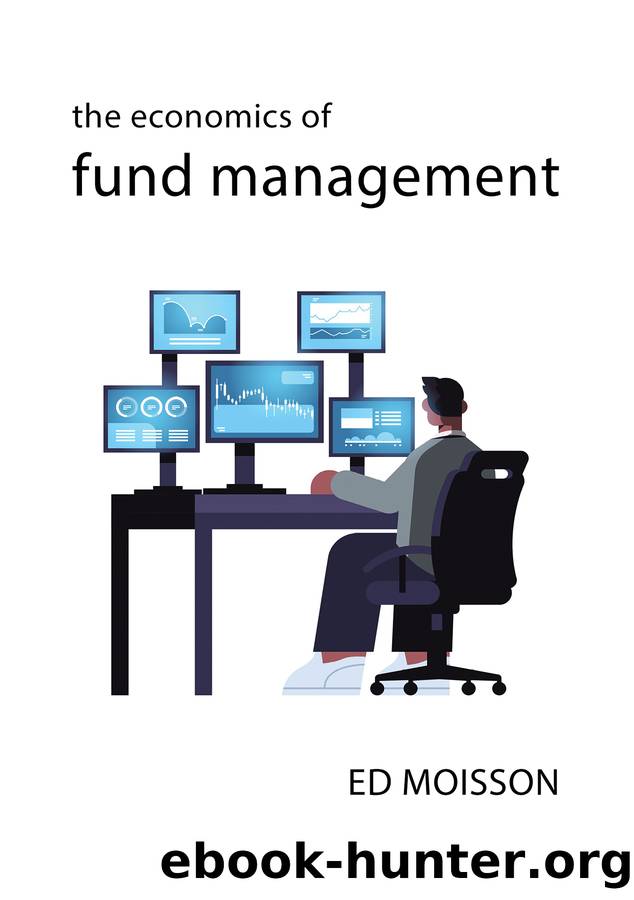The Economics of Fund Management by Ed Moisson;

Author:Ed Moisson;
Language: eng
Format: epub
Publisher: Lightning Source Inc. (Tier 3)
Published: 2022-06-15T00:00:00+00:00
Figure 6.1 UK retail investor average holding periods: (years)
Source: Investment Association, Investment Management in the UK.
As mentioned, understanding this dynamic matters as it reveals the tensions inherent within an asset management company, which leads to a better understanding of the way any of these businesses are run. For example, this can provide a barometer against which the actions or claims of an asset manager can be measured by prompting the question: in what way does this help the long-term growth of client assets?
Asset managers are well-aware of the criticisms they receive for paying relatively large salaries and achieving high profit margins while many actively managed funds fail to outperform market indexes or their passively managed peers. It is often for this reason that firms or their representatives are keen to point out other roles that asset managers play in a capitalist economy, often linked to the role of active managers in particular. This was shown in one investment analystâs paper that compared passive funds unfavourably to an economy run on Marxist principles, while making the case for active managers being âa force for social goodâ (Fraser-Jenkins 2016).
It may well be that fund managers, via mutual funds or institutional mandates, serve a role in a capitalist economy by supporting companies, perhaps most influentially smaller companies, in this way. But it does seem to be a rationale based on hindsight: retrospectively fitting a purpose onto the investment industry that is a by-product rather than its reason for existing. Some, even many, asset managers see their role as allocating clientsâ capital to companies that they believe will grow over the long term and where their involvement will help make that growth sustainable (i.e. investing), rather than solely picking stocks that they think will rise in the near future (i.e. more akin to gambling), but that does not mean this is the reason why clients give asset managers their money. And this is before any discussion of whether the fund management industry is really the most efficient way to allocate capital to companies if it was not for these firmsâ primary, overriding purpose.
This distinction between investing and gambling underlines the need for asset managersâ effective engagement with investee companies in order to deliver on their obligations to clients. Engaging with companies goes beyond simply providing capital and involves interacting with their management teams and ultimately holding them to account. In this way, the rationale for an emphasis on engagement does not come from an abstract social purpose or an extra justification for charging fees. Instead it comes from asset managersâ obligations to clients and to secure their long-term goals, effectively acting as stewards of their clientsâ assets. Stewardship and engagement are thus interlinked and sometimes referred to interchangeably. Seen in this light, the increased push for asset managers to consider the environmental and social impact of the companies in which they invest are entirely logical and suggests an evolutionary step in the management of investments that some firms took up many years ago.
These two
Download
This site does not store any files on its server. We only index and link to content provided by other sites. Please contact the content providers to delete copyright contents if any and email us, we'll remove relevant links or contents immediately.
Life 3.0: Being Human in the Age of Artificial Intelligence by Tegmark Max(4524)
The Sports Rules Book by Human Kinetics(3599)
ACT Math For Dummies by Zegarelli Mark(3569)
The Age of Surveillance Capitalism by Shoshana Zuboff(3435)
Blood, Sweat, and Pixels by Jason Schreier(3143)
Unlabel: Selling You Without Selling Out by Marc Ecko(2996)
Urban Outlaw by Magnus Walker(2953)
Hidden Persuasion: 33 psychological influence techniques in advertising by Marc Andrews & Matthijs van Leeuwen & Rick van Baaren(2793)
The Pixar Touch by David A. Price(2746)
Bad Pharma by Ben Goldacre(2738)
Project Animal Farm: An Accidental Journey into the Secret World of Farming and the Truth About Our Food by Sonia Faruqi(2668)
Brotopia by Emily Chang(2596)
The Content Trap by Bharat Anand(2499)
Slugfest by Reed Tucker(2426)
The Airbnb Story by Leigh Gallagher(2380)
Kitchen confidential by Anthony Bourdain(2323)
Coffee for One by KJ Fallon(2020)
Smuggler's Cove: Exotic Cocktails, Rum, and the Cult of Tiki by Martin Cate & Rebecca Cate(1996)
Beer is proof God loves us by Charles W. Bamforth(1938)
